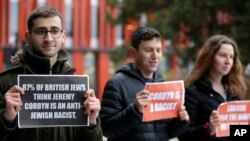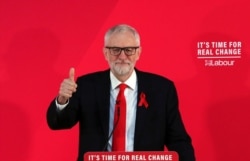"Something horrible has happened to British politics," said Labor lawmaker Ruth Smeeth. The Jewish parliamentarian has had to turn her home and office into fortresses, and wherever she goes, she carries a panic alarm so help can be summoned quickly, if needed.
Like Labor's other Jewish MPs, the 40-year-old Smeeth, whose Staffordshire constituency is at the heart of a region famous as the home of the British pottery industry, says the threats against her and other Jewish MPs is only becoming worse. They are being bombarded by death threats, often via social media.
Mindful of the 2016 killing of Labor lawmaker Jo Cox, police have cautioned Smeeth not to go out alone, especially when campaigning in this month's highly toxic and bruising general election.
"For the past 18 months or so, I have not been allowed on public transport by myself," Smeeth told her local newspaper. "You won't ever see me at a public engagement by myself. … When I am knocking on doors, someone needs to be with me. Someone would have to meet me if I wanted to go for a walk."
Lawmakers and candidates across the board have been reporting a surge in threats and abuse in recent weeks. According to a recent BBC survey of MPs, the abuse has been increasing dramatically since the 2016 Brexit referendum, which has scrambled British politics and polarized the country. The lawmakers talked to the broadcaster about receiving photographs of decapitated bodies, being surreptitiously followed and filmed, and having dog feces smeared on their doors.
In the run-up to the election, pro-Brexit and pro-EU lawmakers were being hounded on the streets and roundly abused after votes in the House of Commons as they departed the building. More than 100 MPs say they have been in contact with police about physical threats, a state of affairs few Britons thought they would see in a country that likes to think of itself as tolerant and calm.
For Labor's Jewish politicians, the abuse they are receiving is seeded invariably with anti-Semitism. Even more jolting for them, the threats are coming not from partisan opponents affiliated to rival parties, which is generally the case with non-Jewish lawmakers, but seemingly from far-left anti-Zionist members of their own party.
Targeting Smeeth
Smeeth is one of the biggest targets.
"I think it's because I'm Jewish and because I'm a woman," she said.
The venom being directed Smeeth's way may have much to do with her highly public clashes with Labor leader Jeremy Corbyn, who has been dogged by charges of anti-Semitism and criticized for not doing to enough to expel from the party far-left allies who express anti-Jewish sentiments at meetings or on social media platforms.
Accusations of anti-Semitism have mounted since 2015, when Corbyn won a surprise leadership contest largely due to backing from a well-organized Trotskyite youth group known as Momentum, which is pro-Palestinian and anti-Zionist. The anti-Semitism dispute has settled into a grim pattern with frequent, ugly flare-ups and then pauses, as the warring sides have sought accommodation.
Corbyn supporters say their critics conflate criticism of Israel with anti-Semitism. Their opponents say the far-left opposition to Israel and its anti-Zionism bleeds and morphs all too easily into anti-Semitism.
'A new poison'
The prospects for accommodation are receding fast. Last week, Britain's chief rabbi, Ephraim Mirvis, made an unprecedented intervention for a British faith leader in an election and accused Corbyn of presiding over a party that has become deeply anti-Semitic.
"A new poison — sanctioned from the very top — has taken root" in Labor, the rabbi wrote in a scathing article for The Times newspaper. He said Britain's 260,000 Jews fear the prospect of Labor forming the next government.
"The overwhelming majority of British Jews are gripped by anxiety," he wrote. "During the past few years, on my travels through the length and breadth of the U.K. and further afield … the question I am now most frequently asked is, 'What will become of Jews and Judaism in Britain if the Labor Party forms the next government?'"
He added, "We sit powerless, watching with incredulity as supporters of the Labor leadership have hounded parliamentarians, party members and even staff out of the party for facing down anti-Jewish racism."
For a Jewish leader in Britain to write that about any of Britain's parties would be startling enough, but it is even more jolting when it comes to Labor, which until recently was seen by many British Jews as their natural political home.
A shift started under former Prime Minister Margaret Thatcher, who was seen as pro-Israel and appointed Jews to her Cabinet. By 2010, 50% of Jewish voters backed the Conservatives. Now, two-thirds say they are unlikely ever to vote for Labor again, according to surveys.
Labor has hit back at the criticism, rejecting the chief rabbi's claims.
"Jeremy Corbyn is a lifelong campaigner against anti-Semitism and has made absolutely clear it has no place in our party and society and that no one who engages in it does so in his name," the party said.
Poll results
But an opinion by YouGov last week suggested that Corbyn's most ardent supporters are more likely to be anti-Semitic than those of other party leaders.
The poll found that more than one in three of those who "strongly like" the Labor leader agreed with four or more statements deemed to be anti-Semitic, while 58% agreed with two statements deemed to be anti-Jewish.
The clash between the Labor leadership and the chief rabbi has only worsened following Corbyn's refusal to apologize to Britain's Jews in a television interview last week with the BBC's Andrew Neil, one of the country's toughest television interviewers.
The attack by the chief rabbi is potentially hugely damaging for Labor, which has already seen a handful of Jewish MPs quit the party and join the rival Liberal Democrats.
Britain's relatively small Jewish community, estimated at just under 300,000, doesn't have much impact on the result of British elections. The Jewish vote in terms of its numbers is only marginally significant in about half a dozen seats in the British capital and Manchester. But only in two seats in north London is the vote concentrated enough for Jewish voters potentially to swing the result one way or another. Both those seats are currently held by the ruling Conservatives.
Nonetheless, the community's opinion has become outsized in this election, with anti-Semitism in the Labor Party becoming one of the hot topics after Brexit and the state of the country's public services.
Polls suggest the accusations of prejudice against Corbyn and the circle around him are making middle-of-the-road voters think twice about voting for Labor.









